- Home
- Terri Blackstock
Covenant Child Page 2
Covenant Child Read online
Page 2
I leaned a little too far, and the chair began to scoot away. My father dove to rescue me as I fell. I didn’t miss a beat, but went back to stirring my salad.
“I’m impressed,” she said. “How many rescues like that do you handle at each meal?”
“Oh, four or five . . . dozen.” He winked at her and popped a piece of French bread into his mouth. “That’s the beauty of a tiny kitchen. I can reach either of them without too much effort.”
I’ve driven by that little house we lived in and watched the children who live there now run and tumble in the yard behind it. The neighborhood still looks safe and sweet, though age has tattered the homes. I’m told it was new when we were small, though. With only two bedrooms, I suspect the house was adequate for our needs. In the pictures I’ve seen of us in that house, the place was always clean and neat, though unimpressive. One snapshot tells the story of our brief art careers. Finger paintings and silhouettes and little construction paper butterflies covered the refrigerator, and two pairs of tiny little tennis shoes sat beside the door.
I study those pictures with sadness, because it truly looked like a home.
That night, we fought over the plates in our special twin language that no one else understood, and our father called out, “Talk English, girls.”
Amanda gave him a curious look.
“They have this unique language they use to talk to each other,” he said. “Lots of twins do it, but I try to stop them when I hear it.”
“It must be amazing having twins.”
“It’s interesting; that’s for sure.”
Amanda—the nice lady who looked like the princess we’d expected—gave us each two plates to settle our argument. She watched as we arranged them in a three-year-old style that would have chafed Amy Vanderbilt.
As we shoved the silverware around, my dad turned back to Amanda.
“So, how are we doing? Are you ready to run away screaming just yet?”
“No,” she said, a giggle bursting out of her, “they’re absolutely precious. And you’re doing such a good job with them.”
We beamed and worked harder to get the table set just right.
“Well, I understand rebellion kicks in in another few years, so I have a long way to go.”
We had set three plates so close together that they were touching, and one was alone across the table. “Daddy, that’s yours,” I announced.
“They want to sit by you,” he said. “You don’t know how lucky you are. Shame you wore white pants. I’d better get you a towel.”
He insisted she put the towel over her lap to protect her from our soiled little hands and sauce splashing from carelessly slurped noodles. We always slurped with great gusto.
But Amanda didn’t worry about spaghetti sauce on her clothes. She was flattered that we liked her enough to want to be close to her.
Amanda recalls that we went to bed early that night. My father hosed us down in the bathtub while she cleaned up the dishes, and then we ran in to say good night in our bare feet and flannel pajamas, dragging battle-weary blankets behind us. She followed him into our little room to kiss us good night and watched as we debated over which bed to sleep in—Lizzie’s or mine—because we always slept together. We curled up together, legs entangled and arms flung over one another. We had that uncanny twin closeness that scientists find fascinating. Sometimes we dreamed the same dreams as we lay together, like two halves of the same body. Neither of us could ever sleep alone.
When Amanda speaks of that night, she gets a catch in her throat. According to her, my father wore a soft, vulnerable expression when they returned to the living room. He dropped down next to her on the couch. “Bet you never thought you’d have a date like this.”
“It’s been fun. I love being around the girls.”
“That’s good, because I kind of hate being away from them.” He leaned back, resting his head on the back of the couch. Looking over at her, he said, “So tell me about you.”
“What about me?”
“Everything. Starting with how your parents met.”
She laughed too loudly. “You’re kidding, right?”
He shifted to face her. “What? You don’t think a man could be fascinated with you?”
His eyes were serious, like they’d been when she’d first seen him strumming that guitar. “My parents met in the emergency room after a Fourth of July picnic that went bad.”
“Fireworks accident?”
“No. Potato salad accident. My mother’s cooking, actually. She almost killed half the town.”
“So your father had a thing for dangerous women?”
“Actually, no. Not right then. But she felt so guilty that she took phenomenal care of him until he was better. Then he fell in love with her. Her cooking did improve, eventually.”
“Great story.” He shifted his body to face her and set his elbow on the back of the couch. “So . . . then you were born and grew up into a beautiful woman who would catch my eye at a Bible study.”
The grace in that statement made her heart swell, and by the time the evening was over, she was head over heels in love with my father, and counting the blessings that seemed enough to last for the rest of her life. And ours, too.
THREE
I find it hard to believe that my father didn’t kiss Amanda until their seventh date, which happened to be a week after that dinner with us. But Amanda swears it’s true. She’d had a crash course in our dad and found herself distracted and miserable whenever they were apart. The kiss, which she’d been anticipating to the point of madness, seemed to seal her destiny.
“So . . . ,” he said, his breath marking the word on her skin, “are you extremely attached to your sanity, or is it something you could do without?”
It wasn’t quite what she’d expected after the first kiss, but his fingers still lingered on her face, and his lips hovered so close . . .
“Why do you ask?” she murmured.
“Because it occurs to me that the idea of marrying me might cost you your faculties.”
She later said that if hearts really melted, hers would have puddled around her toes. “It would cost me more to say no,” she whispered.
“Then don’t say it.”
It was then that the realities she had avoided for the last several days began to flash like a neon sign in her mind. He didn’t know everything about her. She had expected to have more time, to break it to him slowly . . .
But it couldn’t wait any longer.
“Jack, there’s something I haven’t told you yet. Something that might change the way you feel.”
“Nothing,” he whispered. “Nothing could change it.”
She cleared her throat and backed away from him, looked down at her belt buckle, absently ran her hand along the chrome. “I still need to say it.”
“Okay.” He waited, his face open to whatever she was about to reveal.
“I’m not able . . . to have children. Not ever.”
His slow frown held more compassion than disappointment. “Why not?”
“Because I had cancer.”
His expression went from compassionate to fearful. “You what? When?”
“Well, I had a hysterectomy a year ago. The cancer’s in remission, and the doctors say my prognosis is excellent.”
He reacted as if he’d just received a death sentence and a reprieve, one right after another. “Thank You, God.” He grabbed her then and pulled her against him, held her close. “I wish I could have been there for you. I’m so glad you’re all right.”
“Me, too.” His response left her with a lump in her throat, and well it should. My own throat gets tight when I think about the kind of man it took to react that way.
“But, Jack, did you hear what I said?” She touched his face. “I can’t have children.”
“You certainly can.” He tipped her face up to his. “You can have mine. Lizzie and Kara already love you.”
She started to cry then, big, rolling t
ears that she couldn’t control. “Oh, Jack, I love them, too. I’d count it such an honor to be their mother . . . to take care of them for the rest of their lives, to love them like my own.” She sucked in a sob, then whispered, “God is so good.”
“Yes, He is.” Jack kissed her again. “Yes, He’s very good, to bring you to me . . . to us . . .”
And I suspect he meant every word.
He held her for a while, letting her cry against his shirt. She says it felt so natural being in his arms, knowing his love for her, feeling his heart beat against her face. Sometimes when I close my eyes and concentrate hard, I think I can remember that feeling.
His own revelation followed close behind hers. “I have a confession to make, too,” he whispered. “There’s something I have to tell you before I marry you.”
He could have told her he was wanted in three states, and it wouldn’t have mattered. “What?”
He drew in a deep, foreboding breath, like a man about to share the worst news of his life. “It’s about my family. Actually, my father.”
“What about him?”
“It’s just that . . . he’s . . . Paul Holbrooke. The billionaire.”
“The Paul Holbrooke?” Her jaw dropped, and she gaped at him. “You’ve got to be kidding me.”
“No, I’m not.” He looked like a man whose skeleton was out of the closet. “And I would love it if I never had to tell you because I don’t want it to change anything about us. I don’t live off of his money. I love my father, but I got rid of the trappings of his money a long time ago. I don’t like for people to know who I am because it too often changes the way they treat me. I’m not going to inherit his money. None of it will ever be mine.”
She squinted at him, trying to follow his speech. “Jack, you act like this is bad news. I’m not really seeing a downside.”
“I thought you’d be mad that I didn’t tell you right away.”
“Why didn’t you? It’s not like it’s some terrible thing. There aren’t many women who’d be upset that they’re marrying a billionaire’s son.”
“I wanted you to love me for me. I wanted to know that it has nothing to do with the money.”
“Well, I hope you do know that.”
“I do. That’s why I want you to marry me. But are you okay with never having a dime of my father’s money?”
“Of course,” she said.
“I’m serious. In the event of his death, I want him to give my portion to charity. I’ve told him that.”
“That’s fine, Jack. I understand.”
He leaned back on his couch and pulled her head to his shoulder. Kissing her temple, he said, “I was hoping we could elope. I don’t want to deprive you of your fairy-tale wedding, if that’s what you want, but it’s not going to be easy. If we have a wedding, my parents will take over, and they’ll invite ten thousand of their closest friends, and the paparazzi will take a sudden interest in you, and I’ll never again get to live in this town as plain old, ordinary Jack Holbrooke, the pilot and father of twins.”
“I don’t care about a wedding.” She touched his face with her fingertips. “If you want to marry me, I’m already in my fairy tale.”
That serious look on his face melted away, and he lifted her off the ground and swung her around “Doing anything tonight?”
She caught her breath. “Tonight? Tonight?”
He set her down and looked into her eyes. “If I’m moving too fast, just tell me. I don’t want to scare you to death. It’s just that . . . I don’t think I can wait. Amanda, I never thought I could feel this way again. Truth is, I want to marry you tonight because nights are so long without you. And because you smell good. And because I’m so in love with you that I think I might not make it until some far-off wedding date. My heart starts racing when I hear your voice on the phone, and I get weak at the sight of you. It’s painful. Two weeks would be far off to me.”
Her eyes twinkled as she took in the words. “Me, too.”
“I could call the Guerreros, who babysit the girls sometimes, and just ask them if they could stay all night. Then we could have our wedding night to ourselves.” His thumb drifted across her bottom lip. “What do you say, Amanda? Are you crazy enough to marry a billionaire’s disinherited son on a moment’s notice?”
“I didn’t fall in love with a billionaire’s son. I fell in love with a guy who plays guitar and wears flannel shirts and is crazy about his babies . . .” She reached for the phone and handed it to him. “Call them.”
He grinned at her breathless whisper and took the phone.
“And I’ll call my dad,” she went on. “He’d never forgive me if I didn’t let him give me away.”
“Will he be upset?”
She smiled. “No. I’ve already told him about you. He might be a little surprised by how fast things are moving, but he’ll give us his blessings. You’ll see.”
They got their marriage license just before the office closed that day, then were married in the little chapel attached to their church. My dad dressed us up in our Easter dresses, which thankfully still fit, and bought us little white baskets with rose petals in them. We celebrated as if Amanda married us instead of him. He told us she would be our new mommy because she loved us so much that she couldn’t stand to be away from us.
They tried to put one of us on each side of the happy couple for the pictures, but Lizzie and I didn’t want to let go of each other. We were hams in the privacy of our home, but in front of other people, we often got bitten with the bashful bug. So we stood in front of them for the pictures, our white-gloved hands clasped tightly together.
Amanda’s father was there to give her away and to welcome us into the family. Our grandparents, stunned but cooperative, arrived by helicopter for the event.
My grandfather would have showered our father and new mother with a limousine and mansion, but my dad only allowed his father to give them a night at a romantic little inn in Natchez. My grandparents took us home, where the Guerreros waited. Amanda and my dad went to Natchez, checked into the romantic little room, and a horse and carriage took them to the cozy restaurant, where my grandfather had reserved a private table for them. They talked of their future and their dreams, then hurried back to the honeymoon suite where they knit their souls and bodies together, becoming one in every sense of the word.
It was the most special night of Amanda’s life, and probably mine and Lizzie’s, too. It changed our lives in so many ways, even if it was for a very short time. I’ve learned that you can’t deny those precious moments in your history just because you know how fleeting they were.
To Amanda, it seemed like those moments would last forever, each one better than the one before it. It’s good that she didn’t know what lay ahead of us all.
Later that night, as they sat out on the balcony of their room, gazing up at the stars, my father asked Amanda, “How does it feel to be a mommy?”
“It feels just right.”
“It’s nice to know I’m not the only one in Lizzie’s and Kara’s lives anymore. That if anything ever happened to me, you’d take care of them. You would, wouldn’t you, Amanda?”
She sat up and looked into his eyes. “I promise, Jack. They’re my children now. I’ll take care of them for the rest of my life.”
His own eyes grew misty. “I have perfect peace that that is a promise you’ll keep.”
But looking back, I see the naiveté in that simple little promise. If she had known what it would mean, I wonder if she would have made it.
FOUR
Amanda became our mother in almost every way. She quit her job to stay home with us and turned into some kind of Betty Crocker clone who spent her days wiping faces and hands and dirty tables. Happiness had the face of twin toddlers who shadowed every move she made, it sounded like my father’s laughter, and it felt like his arms. The family she’d thought she could never have became the joy she thought she’d never lose. Pictures of those days don’t show stress on her face,
but a brilliant joy. In all of them, we’re laughing and running and bouncing and chattering. Sometimes when I sleep, I think I can hear the sounds of happiness in my head. Laughter whipping up on the wind, my father’s gentle teasing, Amanda’s soft delight . . . and our endless giggles, as if the joy would never end.
But it did. Suddenly, cruelly, in one of those twists of life that leaves its irrevocable imprint on you.
My father’s cousin was getting married, and he had planned to fly his parents and us to the wedding in Southern California. That morning, I got sick, and Amanda decided to stay behind with Lizzie and me and nurse me back to health.
My grandparents waited at the airstrip when Amanda dropped my father off. He nuzzled our necks, reducing us to screaming giggles. Then he kissed Amanda and hugged her tight.
Amanda stood with us, pointing to the sky and the plane growing smaller and smaller in the clouds.
“Wave bye-bye,” she whispered to us. And we waved, mesmerized, our eyes following the spot that grew smaller and smaller, until it entered a cloud and vanished entirely.
“Do it again, Mommy,” Lizzie said.
Amanda laughed in that lilting way of hers. “I can’t do it again, honey. Daddy’s gone.” She didn’t know how true those words were.
I have a dream at night. I’ve had it for years. It’s of that same plane with me on it, rolling down the airstrip, faster and faster, then leaping into the air. I’m standing on the tarmac watching it grow smaller and smaller, knowing I’m somehow outside it and inside it at the same time. I hear a woman’s voice next to my ear, whispering, “There he goes. Wave bye-bye.”
And I wave at the plane, and I see my own face looking out, sad and stricken, like I know something that no one else knows.
And then the plane disappears into the clouds.
I always wake up feeling sweaty and anxious . . . and frightened, though for the longest time I didn’t know why. The disappearing plane shouldn’t be a frightening dream, not like the other dreams of monsters or ghosts or people chasing me.

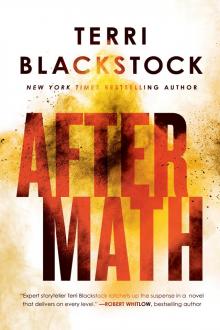 Aftermath
Aftermath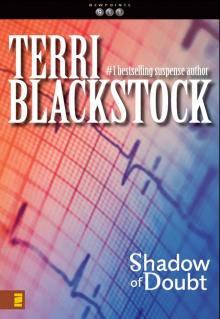 Shadow of Doubt
Shadow of Doubt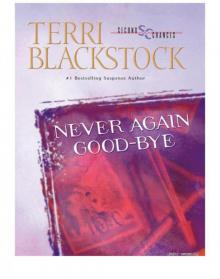 Second Chance - 05 - Never Again Good-Bye
Second Chance - 05 - Never Again Good-Bye Miracles
Miracles Broken Wings
Broken Wings the Cape Refuge (Cape Refuge Series Book 1)
the Cape Refuge (Cape Refuge Series Book 1)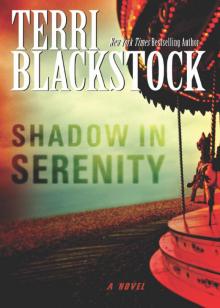 Shadow in Serenity
Shadow in Serenity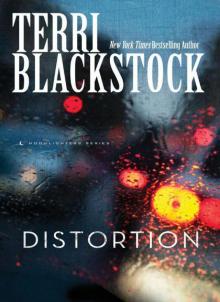 Distortion (Moonlighters Series)
Distortion (Moonlighters Series)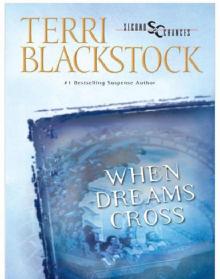 Second Chance - 02 - When Dreams Cross
Second Chance - 02 - When Dreams Cross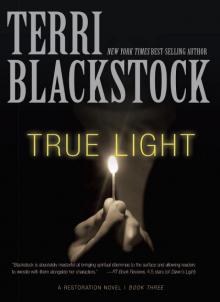 True Light
True Light Private Justice
Private Justice Last Light
Last Light Downfall (An Intervention Novel)
Downfall (An Intervention Novel)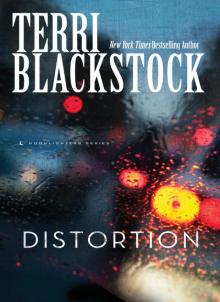 Distortion: Moonlighters Series: Book Two
Distortion: Moonlighters Series: Book Two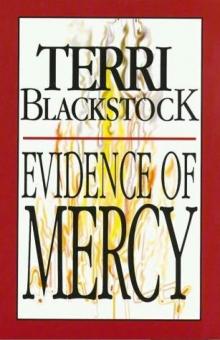 Evidence of Mercy
Evidence of Mercy If I Run
If I Run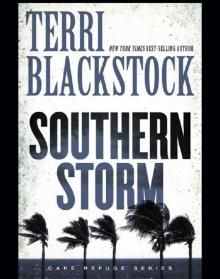 Southern Storm
Southern Storm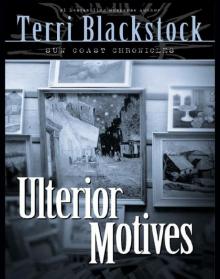 Ulterior Motives
Ulterior Motives Emerald Windows
Emerald Windows River's Edge
River's Edge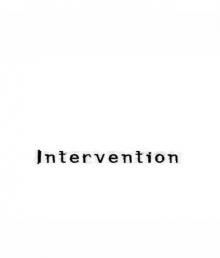 Intervention
Intervention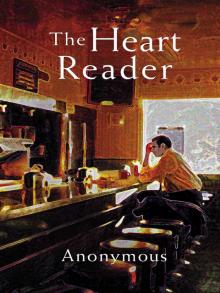 The Heart Reader
The Heart Reader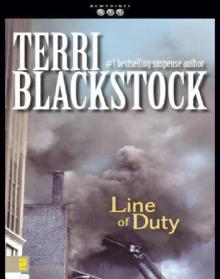 Line of Duty
Line of Duty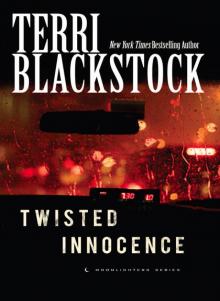 Twisted Innocence
Twisted Innocence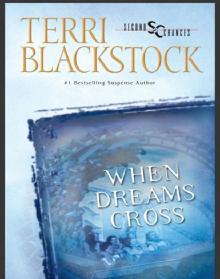 When Dreams Cross
When Dreams Cross Downfall
Downfall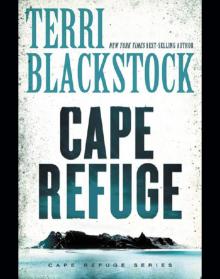 Cape Refuge
Cape Refuge Breaker's Reef
Breaker's Reef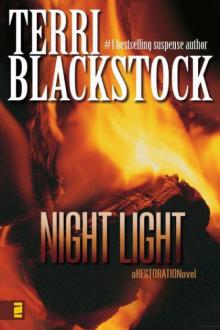 Night Light
Night Light Double Minds
Double Minds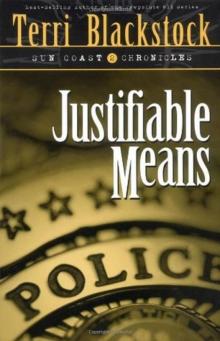 Justifiable Means
Justifiable Means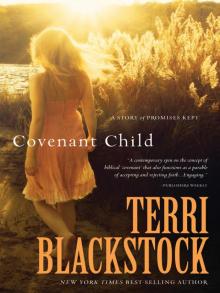 Covenant Child
Covenant Child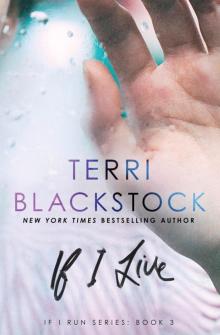 If I Live
If I Live If I'm Found
If I'm Found Vicious Cycle
Vicious Cycle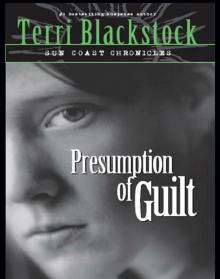 Presumption of Guilt
Presumption of Guilt Trial by Fire
Trial by Fire Word of Honor
Word of Honor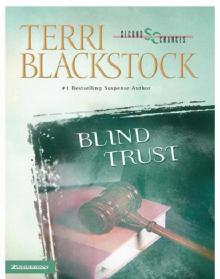 Second Chance - 03 - Blind Trust
Second Chance - 03 - Blind Trust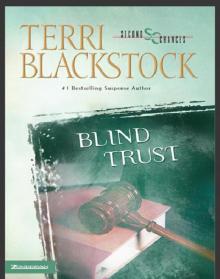 Blind Trust
Blind Trust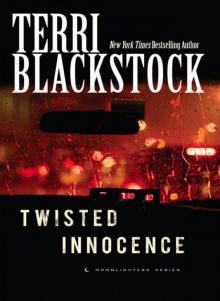 Twisted Innocence (Moonlighters Series Book 3)
Twisted Innocence (Moonlighters Series Book 3) Predator
Predator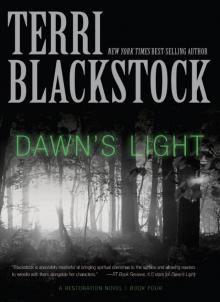 Dawn's Light
Dawn's Light Chance of Loving You
Chance of Loving You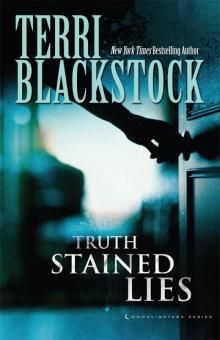 Truth-Stained Lies
Truth-Stained Lies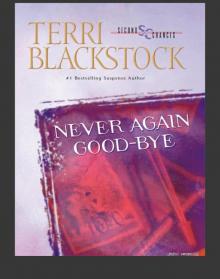 Never Again Good-Bye
Never Again Good-Bye Catching Christmas
Catching Christmas